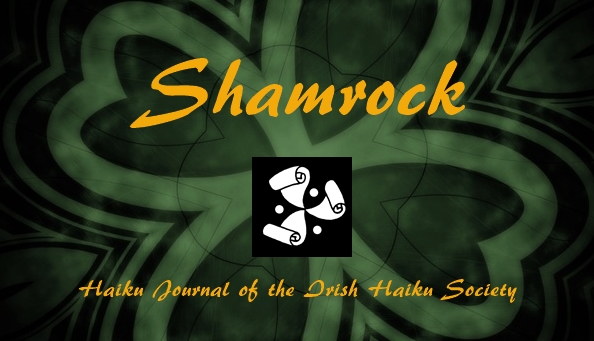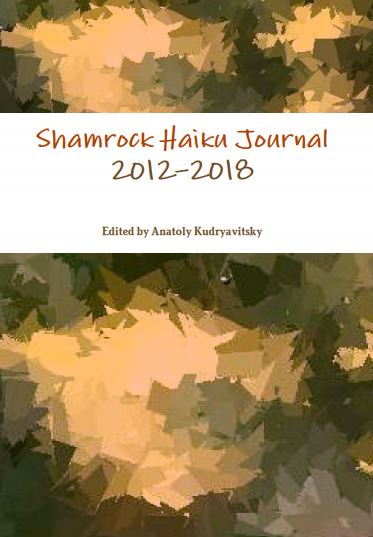the rest of the world
An international online journal that publishes quality haiku, senryu and haibun in English
irishhaikusociety[at]gmail[dot]com
(not for submissions)
Home Page
Archive
Book-Shop

We
are nearly twelve years old! Founded in January 2007, Shamrock Haiku Journal has
since been published regularly. On this occasion, we have prepared SHAMROCK
HAIKU JOURNAL: 2012-2018, a print edition of the twenty
issues of
Shamrock, Nos. 21 to 40, as they appeared on
the Shamrock website. This paper-based collection covers the full range of English-language
haiku, from classical to experimental, as well as haibun. Also included are English translations from
one of the most prominent Japanese haiku poets of the 20th century, Ryuta Iida, and an essay on translating
Matsuo Basho's haiku.
Shamrock
Haiku Journal: 2012-2018
Edited by Anatoly Kudryavitsky.
Copyright © 2012-2018 by Shamrock Haiku Journal.
All rights reserved.
Published
in Dublin, Ireland. Printed
in the United Kingdom. Price
Euro 16.92 Trade
paperback. 302 pp. Preview available here
IHS International Haiku
Competition 2018 announced! The Irish Haiku Society International Haiku
Competition 2018 offers prizes of Euro 150, Euro 50 and Euro 30 for
unpublished haiku/senryu in English. In addition there will be up to
seven Highly Commended haiku/senryu. Shamrock Haiku Journal
Readers' Choice Awards We invite all the readers of Shamrock
Haiku Journal to
vote for the best haiku/senryu poem published in 2018, i.e. in the
issues THIRTY-NINE and FORTY (you cannot vote for your
own poem, though). To vote, send an
e-mail to irishhaikusociety[at]gmail.com with
"Best haiku of 2018" or "Best senryu of 2018" in the subject line.
Please insert the full text of the poem you vote for (only ONE poem in
each category) plus the name of its author in the body of your e-mail.
The deadline for vote is 28th February
clear sky –
The original poems have been
published in "The Meadow Bathes in Yellow" by Gerhand A. Spiller –
Anton G. Leitner Verlag, 2018
Gods
& Fate
Found in
Translation No. Let's start again...
What does Bashō say just before the haiku?
Is the kōan
in the haiku or have I put it there myself? Whether or not shizukasa ya does
represent śūnyatā,
Bashō's image of the heart becoming clear – an image of the 'I/me'
sense of self suspended or negated in a moment of profound insight –
itself suggests a Buddhist element in the haiku. Specifically a Zen
element? Am I unduly influenced by knowing that from about 1680, when
Bashō was in his late thirties, he briefly studied meditation under a
Zen priest, Bucchō, and therefore may have had direct experience of kōan–like
exchanges? It's not much to go on. What if I've fabricated the kōan... ?
ISBN 978-0-244-9767-9-8
5.8"x8.3", perfect binding.
Details and previous winners here:
https://irishhaiku.com/haikucompetition.htm
All the entries shall be postmarked / e-mailed by 30th November 2018.
Good luck to all!
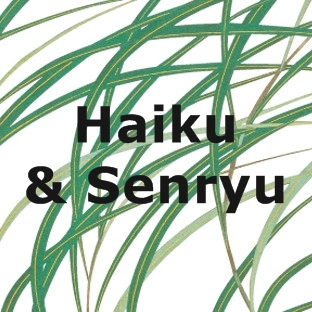
a cluster of mushrooms
the snake's quiet
leavetaking
shifting light
wind pulses
across the marsh grasses
cattails
a red-winged blackbird
fluffs up as it sings
budding maple
the here and there
of warblers
deep winter
the rhythms
of the goats' cuds
morning chill
the scritch-scratch of a nuthatch
in the king pine
--
Hannah Mahoney (USA)
tapas moon
the lush undertones
in the flamenco
whisky moon
the piper wets
his whistle
afternoon rain
wasps nesting
in the eaves
owl call
the stillness of
the valley
--
Ben Moeller-Gaa (USA)
first day of fishing
on the creek bridge
fathers, sons, grandsons
the slow slide
of water on a leaf –
the blink of an eye
afternoon break
a soft breeze
flips the page
--
Adelaide Shaw (USA)
thick morning fog –
the thousand year old call
of a red deer
loafing rocks –
the orange clicks
of bill-tapping puffins
abandoned abbey –
a lone kestrel
among the jackdaws
--
Keith Polette (USA)
longest day
an extra syllable
in the rooster's crow
a dawn
before the dawn
wildfire
shadows
in the dark
the howl's wolf
--
Edward Huddleston (USA)
peat bog
the spreading fire
of cloudberries
frost settles...
many moons dot
the dark field
wild iris
a familiar song
in its throat
--
Debbie Strange (Canada)
friends of friends
of our second cousins...
a cherry tree blooms
koel's call
the housecat's tail
beats time
the end
before the beginning
ebb tide
--
Lorin Ford (Australia)
up-lit cloud
a rise of rosellas
flushes the sky
late winter magnolia petals in the koi pond
morning breeze
casuarina needles flicker
in the stream
--
Gavin Austin (Australia)
night cycle
waxing moons glanced
in tidal mudflats
swollen lake
girdled about
with birdsong
the haar lifts
a seagull floats above
the hissing surf
--
Ian Turner (England/France)
autumn equinox
the lightness
of a leaf
earth tremor
a falcon takes the wind
under its wing
edge of winter
the scrape
of a heron call
--
Martha Magenta (England)
a drumlin's shadow
across a rooftop
the starling's closing song
drizzle-softened hills
fledgling swallows
strengthen their wings
out into the depths
of the darkening lough
a mute swan's ripples
--
Thomas Powell (Northern Ireland)
twilight...
petal from
a misty-blue flower
in a glass of ice water the moon's eye
Bloomsday –
a beach-bound trickle
of straw hats
--
Anatoly Kudryavitsky (Ireland)
rising sun
a lizard basks
under a sandstone arch
beach sunrise
the pastel patina
inside a conch's shell
--
Jay Friedenberg (USA)
warm wind
a green dragonfly
clings to lavender
cold night
a subway door opening
between stations
--
Bill Cooper (USA)
polishing
the cabochon
waxen moon
my walking stick
goes first
frozen lake
--
Seren Fargo (USA)
no bridge
a small cloud
crosses the stream
waiting for spring
bare branches
wear the stars
--
Natalia L. Rudychev (USA)
a crow with more
than a thing or two to say
sour wind
--
Chad Lee Robinson (USA)
desert evening
time enough to outwait
a coyote
--
Frank Hooven (USA)
blue moon
the vein
in my father's hand
--
Jennifer Hambrick (USA)
first winter storm –
the weathervane
points north
--
Michael Dylan Welch (USA)
monks at once
dismantle their web
orb weavers
--dl
mattila (USA)
early spring
the lift of a robin's breast
just before the song
--
Nola Obee (USA)
pretending I hear
the crackle of fireworks –
July rain
--
Nicholas Klacsanzky (USA/Ukraine)
clatter as rain starts
a chipmunk sliding
out the downspout
--
Noel Sloboda (USA)
night fog
the uncertainty
of silhouettes
--
Bryan Rickert (USA)
yard bobcat –
our quiet deck steps
not quiet enough
--
Tony Burfield (USA)
old moon
where will I go
when I am gone
--
Perry Powell (USA)
morning rays
rabbit ears
follow my footsteps
--
Liv Saint James (USA)
first sip of tea
bare cedar branches
cup the moon
--
Chen-ou Liu (Canada)
spring heat...
goslings float
on large waves
--
Marshall Bood (Canada)
city lights
above the neon haze
falcon cries
--
John Hawkhead (England)
moving day
you leave behind
the welcome mat
--
Louise Hopewell (Australia)
night breeze
nightingale picks up
a robin's melody
--
Padmini Krishnan (Singapore)
an addition
to my coffee:
two spoonfuls of rain
--
Polina Reprintseva (Russia – Ireland)
sultry night
a mosquito sips
my dream
--
Lucia Cardillo (Italy)
midnight cooking...
the flames reddening
grandma's eye
--
Nureni Ibrahim (Nigeria)
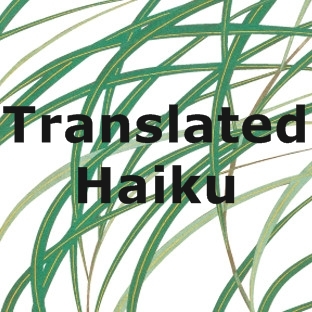
the smell of fresh laundry
from a garret window
end of summer –
in the 'Reduced' section,
a naked mannequin
no one around...
a summer shower
kicks the football
finally home –
on the car roof,
snow from abroad
--
Nikolay Grankin (Russia; translated from the Russian by Anatoly
Kudryavitsky)
loud buzzing
in the sun-warmed grass –
the stream's quiet gurgle
April is here –
a swarm of bees splits up,
forms two cloudlets
the late light
of the July sun –
her hair turns fiery red
once a wheat field,
today a new hardware store...
what more do I need?
--
Gerhard A. Spiller (Germany; translated from the German by Anatoly
Kudryavitsky)
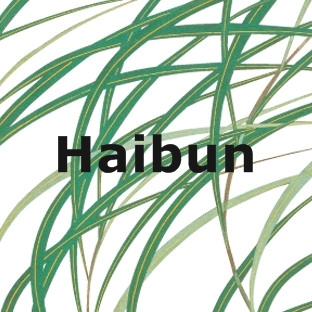
by
Anna Cates (USA)
The Golden Ass –
Hecate waits
at the crossroads
In the days of old, city states devoted themselves to the moon goddess.
Snakes entwined her sinewy arms, while the wood nymph hugged her sacred
tree. Shady consorts encircled Zeus with his definitive thunderbolt.
Constellations guided sojourners across rough seas. Chalices filled to
bacchanalian levels; cornucopia, lubricity, garlic wreaths, agape, and
the wings of victory. And thus, the villagers danced with goat-footed
Pan, centaurs, and satyrs. Hermaphrodites donned laurel leaves. Sacred
bees swirled from hyperborean sunshine into crazy starlight.
Oedipus pondered the unknowable future, the will of the gods, a world
where kings, queens, and paupers strut and fret through divine drama.
No mythology, the truth he beheld at his blindness.
distant thunder –
pausing in the shadow
of the Sphinx
Dental Gold
by
Ruth Holzer (USA)
He drills and pries until the old crown pops out, its original
brilliance dimmed by years of grinding. He explains that he always
removes a crown carefully to preserve the largest possible piece of
gold. He cleans it and sets it aside. Depending on the day-to-day
market price, of course, you might get a little money – one patient
sold his for fifty-five dollars.
I toss it into a drawer with paper clips, tacks and stray buttons.
in the mind's eye
new and old
horrors
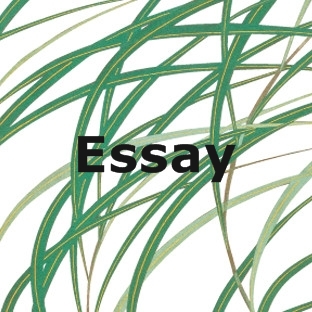
by
Geoffrey Wilkinson (Wales)
In the domain of Yamagata there is a mountain temple called the
Ryūshakuji. Founded by the revered priest Jikaku, the temple is a place
of pure tranquillity. Everyone keeps saying we should see it, so we
double back there from Obanazawa, a detour of about seventeen miles. It
is still light when we arrive. We arrange lodgings at the foot of the
mountain, then climb to the shrines near the summit. The mountain is
made of massive rocks piled one on top of another, covered with ancient
pines and oaks. Earth and stone are time-worn and smooth with moss. The
shrines perched on the rocks all have their doors shut. Not a sound. We
work our way round the sheer cliffs, crawling on hands and knees from
rock to rock and worshipping at each shrine. In the hushed beauty of
these surroundings, the heart knows nothing but peace.
Pretty
straightforward until we get to 'the heart knows nothing but peace', kokoro sumiyuku nomi oboyu.
Key word is sumiyuku,
'becomes transparent': here describes a state of mind – or 'heart', the
literal meaning of kokoro,
which works fine in English – that is now crystal clear, like turbid
water after sediment has dissolved away. In its inner state, the heart
exactly mirrors the 'pure tranquillity' of the external surroundings.
How do other
translators do it?
At one extreme,
Nobuyuki Yuasa spells it out very fully with 'I felt the purifying
power of this holy environment pervading my whole being.' At the other
extreme is Sam Hamill, who pares Bashō's prose right down to 'I sat,
feeling my heart begin to open.' 'I sat' is poetic licence as Bashō
doesn't say whether he is sitting or standing at this point, yet it's
imaginatively justified, and 'feeling my heart begin to open' is simple
and direct. And directness is what matters, the experience before any
attempt at understanding or explanation...
What about going all
the way to 'the heart knows nothing but itself' – the heart
so transparent, the sediment so completely dissolved, that nothing
clouds it, not even awareness of the surroundings?
Problem: 'the heart
...itself' might be misunderstood as making 'heart' synonymous with
'consciousness', or with 'self' in the familiar sense of our awareness
of 'I-ness' or 'me-ness'. And that would look like an act of cultural
hijacking because, whatever else Bashō may mean by kokoro sumiyuku, it
has nothing to do with an inward-looking consciousness or the 'I/me'
self – on the contrary, surely he's suggesting a suspension or negation
of the 'I/me' self. Keep it simple and stick with 'knows nothing but
peace'.
Why 'the heart' and
not 'my heart'?
No help from Bashō,
who doesn't use personal pronouns or their determiners, but it's true
'my' is the obvious choice. Trouble is English demands pronouns, and
we've already committed – you agreed – to 'we' to recognize that Bashō
has climbed to the summit together with his companion, Sora: 'our
hearts know nothing but peace' would be presumptuous (Sora might be
feeling something completely different for all anyone knows!), while
switching to 'my heart' is both awkward and avoidable since 'the heart'
is equally natural in this context. QED.
All right... We've
come full circle, back to the haiku:
shizukasa ya
iwa ni shimiiru
semi no koe
Back to the haiku, and back to
our three complications. Firstly, the translation of shizukasa
('stillness', 'quiet') should also evoke something akin to sabishisa (with the
nuance 'serene solitude' rather than the dictionary definition,
'loneliness') because, instead of writing shizukasa with the Chinese
character normally used for that word, Bashō has chosen a different
character that visually conveys a sense of sabishisa. In
Japanese it works almost as a form of synaesthesia – the ear hears shizukasa, so to
speak, while the eye sees sabishisa
– but can the effect be approximated somehow in English? Second
complication: shimiiru has a spectrum of possible translations, ranging
from 'permeate' or 'seep in' at the softer end through to 'pierce' or
'bite in' at the stronger end. Which to go for? And thirdly, Japanese
does not distinguish between singular and plural: are you going to
translate iwa ni
as 'into a rock' or 'into the rocks', and semi no koe as 'a
cicada's voice' or 'cicadas' voices'?
Start with the
singular/plural conundrum... How about making iwa 'the rock' and
then it's as ambiguous as the Japanese: could be a single rock – 'that
big one over there' – or many rocks treated as a sort of collective
noun – 'the rock of the whole mountain, made up of individual rocks
piled on top of each other'.
Done, 'into the
rock'. Have to make an explicit choice, though, with semi.
'Cicadas' plural is
more plausible because it's unlikely there would only be one cicada
among all those trees on the mountain. On the other hand, a single
cicada is quite capable of making its presence known by its repertoire
of distinctive sounds, some of which are ear-splitting in volume and
pitch. The decider: where 'cicadas' anticipates a rolling, repeating
cacophony extended over time, 'cicada' anticipates sound focused into a
single moment, which is better suited to the arrested-in-time feel of a haiku.
One cicada it is.
Next the shizukasa/sabishisa
question. Some translators seem to ignore it altogether. Hamill has
'Lonely stillness' – 'stillness' for shizukasa and
'lonely' for sabishisa.
Yuasa opts for 'utter silence' – 'silence' for shizukasa and
'utter' perhaps for sabishisa.
Any improvement on their attempts?
Yes, maybe, although
it involves a bit of lateral thinking. Or cheating, depending on how
you look at it. In the course of their 1,500-mile journey around
northern Japan, Sora recorded almost all the haiku composed by
Bashō, himself and others, and his record reveals that in Bashō's first
version of this haiku the first four syllables were not shizukasa but yamadera, 'mountain
temple'. Now 'mountain temple' immediately recalls the images of the
Ryūshakuji and its precincts that Bashō has conjured up in his prose
description, especially the early-evening atmosphere, the shrines with
their doors closed, and the unbroken silence. These are all images of
deep solitude and serenity – just the qualities of sabishisa suggested
by the Chinese character Bashō has chosen to use. If we take the
'mountain' of 'mountain temple' for what the eye sees in Japanese, sabishisa,
'stillness' for the what the ear hears, shizukasa, the
first line of the translation becomes 'Mountain stillness'. May be as
close as we can get to the the semi-synaesthetic effect Bashō achieves.
More or less happy with it?
Yes... provided you
don't forget Bashō's fifth syllable, ya, the kireji or 'cutting
word'.
As its function is
to indicate a pause, somewhere between a comma and a full stop in
duration, closest equivalent in English is probably a dash. Agree with
'Mountain stillness –'?
Agree.
That leaves shimiiru. Let's not
beat about the bush. Or the tree. The back-to-front subject of the
verb, the thing that's doing the shimiiru, is semi no koe, 'a
cicada's voice'. There's our clue: a cicada doesn't have a 'voice', and
nor does it 'cry', 'trill', or 'sing', as some translators would have
it. There are species of cicadas that screech, shriek, or
shrill,
make harsh and unnerving sounds that, fortuitously, are sibilant in
English – 'a cicada's shrieking', 'a cicada's shrilling' – and
complement the assonance of Bashō's i-wa ni shi-mi-i-ru se-mi
(which in turn perhaps mimics the sound of one or other species?). But
it's not the main point, which is that 'screech', 'shriek' and 'shrill'
do not, or not obviously, invite softer translations of shimiiru such
as 'seep in' or 'sink in'. Some trial and error required.
OK, trial and error.
Put it all together, try first with 'sink in' and see what happens:
Mountain stillness –
a cicada's shrilling
sinks into the rock
Hmm. Apart maybe
from 'mountain' for sabishisa,
it's faithful to the Japanese, uncontroversial, safe... Too safe?
Translated this way, what is Bashō saying?
Perfect stillness is
broken by the shrilling of a cicada. The shrilling sinks into the rock,
and stillness returns. Paradoxically, the stillness is all the greater
for the sudden breaking of it.
Difficult to object
to that interpretation, yet still can't help feeling it's
non-committal. What if Bashō means that the shrilling is lost not just
in the rock, but in the stillness itself? The stillness is so profound
that it cancels out or, a very free translation of shimiiru, 'swallows
up' the shrilling?
Mountain stillness –
a cicada's shrilling
is swallowed up in the rock
Or what if he means
the exact opposite – it's not the stillness that prevails, but the
raucous sound of the cicada? In that case, definitely need to go to the
more forceful end of the shimiiru
spectrum:
Mountain stillness –
a cicada's shrilling
penetrates the rock
Is there a paradox
after all? There was stillness, then a loud noise, and now either the
noise is gone or the stillness is gone...
Yes, I see what
you're trying to do.
Eh?
One way or another,
you're trying to tidy up or explain away the paradox.
Well, why not? It's
not some uniquely Western intolerance of contradiction, if that's what
you're implying. Lots of Japanese readers also find this haiku
perplexing and feel that a screeching insect makes nonsense of perfect
quiet.
Not necessarily an
East-West thing, no... Hear this out. Think word order. Even to arrive at
the most conservative translation, 'a cicada's shrilling / sinks into
the rock', we've had to reverse Bashō's middle seven and last five
syllables, iwa ni
shimiiru semi no koe. If the priority is to be true to the
Japanese and produce meaningful English, and it is the priority, there
can't be anything sacrosanct about Bashō's word order – and that
includes the placing of his first five syllables, shizukasa ya. So,
take a deep breath, move our translation of shizukasa ya from
the beginning to the end
and... far from evading or resolving the paradox, we confront it head-on.
Go further. Make the paradox completely inescapable, amplifying the
noise of the cicada still more by changing 'penetrates the rock' to
'pierces the rock', and deepening the quiet of the Ryūshakuji still
more by changing 'mountain stillness' to... to... 'unbroken silence':
A cicada's shrilling
pierces the rock –
unbroken silence
Translated that way, what is
Bashō saying?
The stillness of a
mountaintop temple and the shrieking of a cicada are not contradictory
or mutually exclusive. Beyond – or within – what we perceive as
paradox, they are two aspects of one and the same reality. Bashō's semi no koe stands
for the reality of the ephemeral, particular world of cicadas, rocks
and trees, poets, and ourselves. But it's a world that comes out of the
timeless, undifferentiated reality represented by shizukasa ya – the śūnyatā of Mahāyāna
Buddhism, seemingly an absolute emptiness that yet contains the
possibility of every thing and every being that is and might be. The
reality of the world is self-evident, insistent, all too present. To
know reality in its timeless, undifferentiated aspect, the heart itself
must be empty, unclouded, kokoro
sumiyuku.
I must be getting
old. Why else would I find myself constantly going back over the past.
Regretting so much of it.
Have the courage of your
convictions, boy!
In his irritable,
soldierly way, Colonel Toker had tried to be encouraging as I dithered
over my answer to a question in his algebra class. Nevertheless his
words live on as a reproach for something in my response that was
wanting then and, all these years later, seems to remain wanting. A
relation to the world lived at the softer end of the spectrum, more
seeping and sinking in than piercing and biting in. Non-committal. No
wonder I've always been drawn to ambiguities. Small, manageable
ambiguities. Contradictions nicely balanced out: on the one hand this,
on the other hand that. Big, unmanageable ambiguities – inescapable
conflicts – evaded altogether: anything but confront them head-on,
which would mean making an explicit choice. Which would mean
committing. Non-committal.
And now this new
voice in my head:
shizukasa
ya
iwa ni shimiiru
semi no koe
A cicada's shrilling
pierces the rock –
unbroken silence
What to make of it?
Do I believe in my own translation? Is it wishful thinking? Am I
misrepresenting Bashō? I've turned his haiku into a baffling
question-and-answer exchange that, in the manner of a Zen kōan,
confounds the rational mind and, by confounding, hopes to jolt it into
a spontaneous understanding of some truth. The truth here is, for want
of a better word, the interchangeability of everything and nothing:
Question:
What is the sound
of absolute emptiness?
Answer:
The screeching of
a cicada.
Enough. Enough. Even
if I have fabricated it, even if there is nothing in Bashō's haiku to
baffle the rational understanding, there's plenty to baffle us in what
we know of reality. We know, as Bashō could not have known, that the
universe – and with it the possibility of our world and everything else
that is and might ever be – literally came out of a great emptiness, a
primordial nothingness, 13.8 billion years ago. So another truth,
literal, metaphoric, or however we wish to take it, is that there are
as many ways of being in the world as there are possibilities in
nothingness and, in a sense, they are all valid. We are where we are,
as the saying goes, and we are what we are. And this has been and is
where I am and what I am, a quietly overwrought schoolboy who struggled
to be fully part of his world and grew up wondering whether he wanted
to be part of it at all. Is that defeatism? Weakness? Complacency?
Laziness? Convention judges us. Other people judge us. We judge
ourselves. Yet what judging is there – who or what is to say that one
way of being is right and another wrong – in the great nothingness from
which we all come?
It's been a long
time in the making, Colonel Toker, but here's my answer:
If a is zero, b is an
indeterminate value. That's just how it is. QED.
